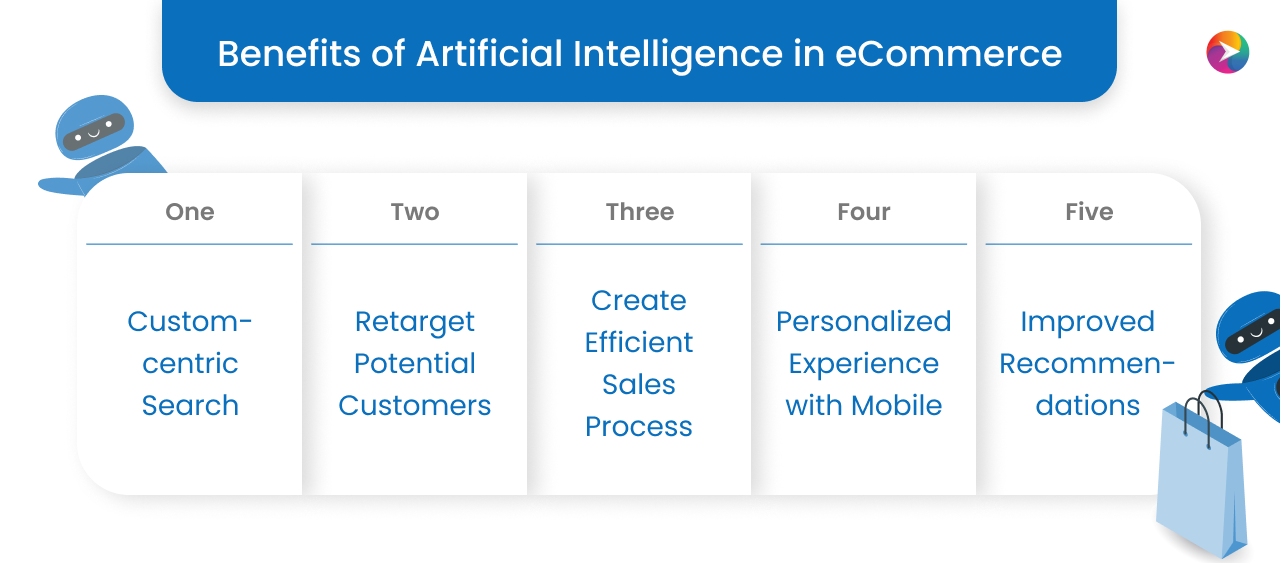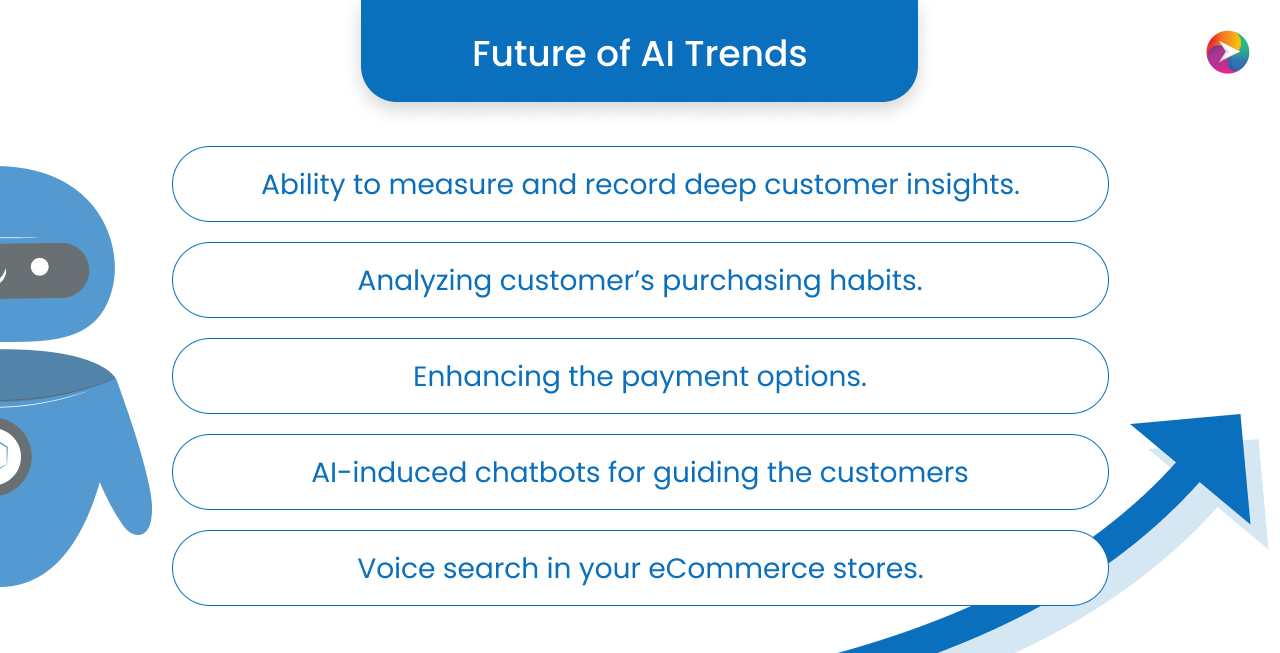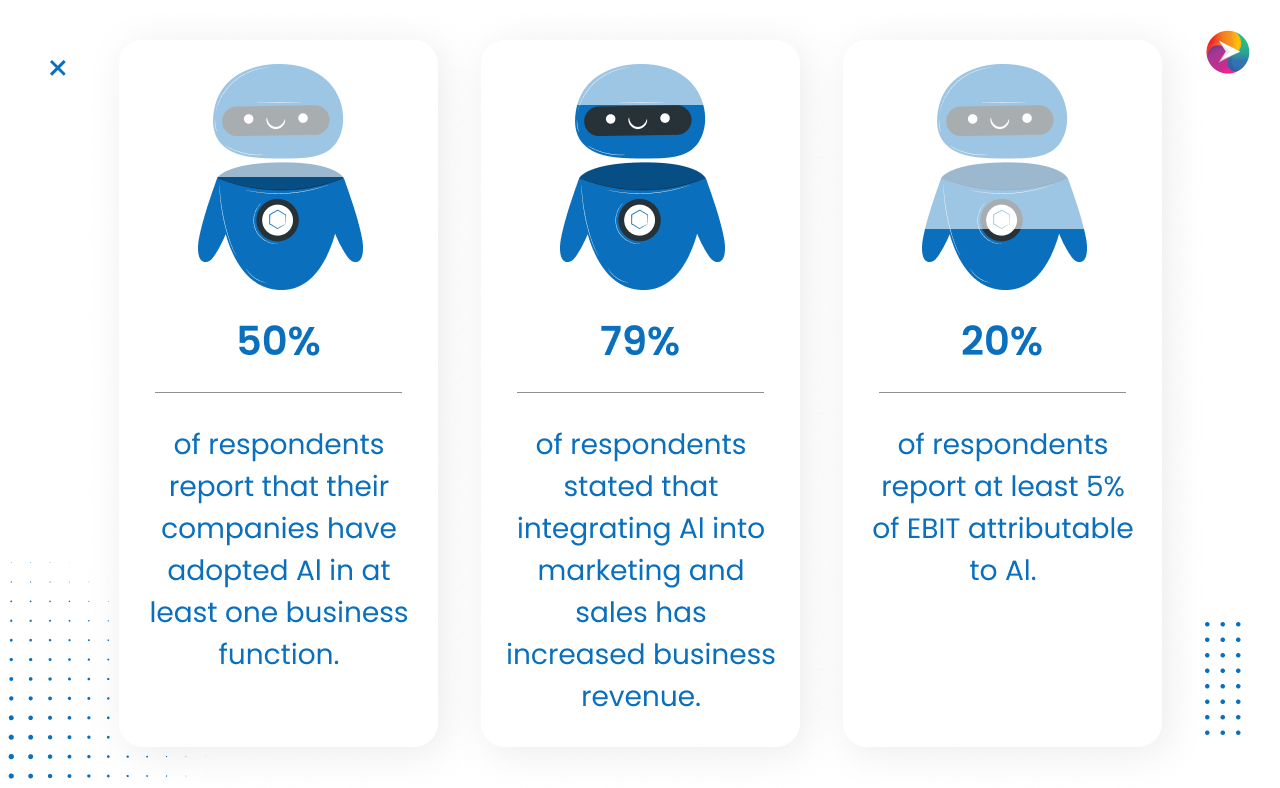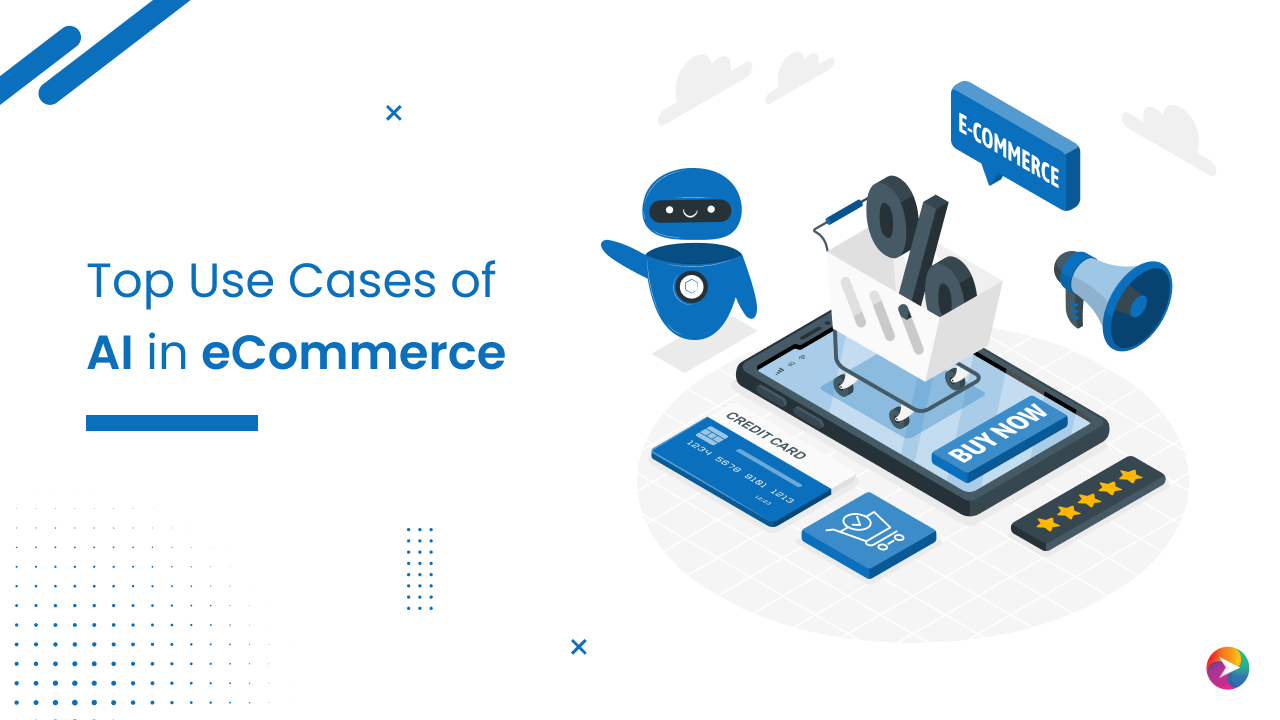 01/11/2023
01/11/2023
Anand Kumar Mishra
7 Mins to Read
Table of content
Top Use Cases of AI in eCommerce
In today’s rapidly evolving digital landscape, eCommerce has emerged as a dominant force in the global marketplace. In a world where technology is advancing at breakneck speed, one innovation has quietly and profoundly transformed the way we shop online. Artificial Intelligence (AI) in eCommerce is not just a buzzword; it’s a powerful force that’s reshaping the industry as we know it. From personalized product recommendations to AI-driven customer support, the impact of AI is evident and its potential immense.
In this article, we will explore how AI is being used in eCommerce, discuss its future applications, and delve into the transformative changes it has brought to the world of online shopping.
How Can AI Be Used for eCommerce?
1. Personalized Product Recommendations
One of the most prominent applications of AI in eCommerce is personalized product recommendations. Gone are the days of generic, one-size-fits-all suggestions. AI algorithms analyze a customer’s browsing history, purchase behavior, and demographic information to provide tailored product recommendations. This not only enhances the shopping experience but also drives sales, as customers are more likely to make purchases when they see products relevant to their interests.
AI-powered recommendation engines, such as those used by Amazon and Netflix, use machine learning to continuously refine their suggestions, becoming more accurate and effective over time. These algorithms consider a wide range of factors, including past purchases, items in the shopping cart, and even what other customers with similar profiles have bought. As a result, customers are more likely to discover products they didn’t even know they wanted, leading to increased sales and customer satisfaction.

2. Chatbots and Virtual Assistants
AI-driven chatbots and virtual assistants are transforming customer service in the eCommerce industry. Chatbots can provide instant responses to customer queries, offer assistance with product selection, and even help with order tracking. They are available 24/7, ensuring that customers can get the support they need at any time.
The advantage of using AI-powered chatbots is their ability to handle a high volume of customer inquiries simultaneously, offering quick and consistent responses. Companies like Sephora and H&M have adopted chatbots to guide customers through their product offerings and assist with sizing and style recommendations, replicating the in-store experience in a digital environment.
3. Inventory Management and Demand Forecasting
Accurate inventory management and demand forecasting are essential for eCommerce businesses to optimize their supply chains and avoid stockouts or overstocking. AI helps in this regard by analyzing historical sales data, seasonality, market trends, and even external factors like weather and holidays.
By utilizing machine learning algorithms, eCommerce companies can predict which products will be in demand during specific times, adjust their inventory accordingly, and minimize losses due to unsold or expired goods. This ensures a more efficient supply chain and prevents revenue loss.
What Is the Future Use of AI in eCommerce?

The future of AI in eCommerce is filled with exciting possibilities that promise to reshape the industry. Some of the key trends and future applications of AI in eCommerce include:
1. Enhanced Visual Search
Visual search technology powered by AI is on the horizon, allowing customers to find products by simply uploading an image. Imagine taking a photo of a stylish outfit you saw on the street and instantly finding similar items available for purchase online. AI-driven visual search can revolutionize the way customers discover products and further personalize their shopping experience.
2. Augmented Reality (AR) Shopping
Augmented reality is set to transform the way customers shop online. Retailers are already experimenting with AR apps that enable customers to virtually try on clothing, visualize furniture in their homes, or see how makeup products will look on their skin. This immersive shopping experience enhances customer confidence and reduces the likelihood of returns, creating a win-win situation for both consumers and businesses.
Read Blog: The Impact of AR and VR on Mobile Apps
3. AI-Powered Customer Support
The future of customer support in eCommerce will involve more advanced AI chatbots and virtual assistants. These bots will become even smarter and more empathetic, capable of understanding nuanced customer queries and offering personalized recommendations. They will be integrated with natural language processing and sentiment analysis, ensuring a seamless customer support experience.
How Is AI Bringing a Change in eCommerce?

AI is ushering in transformative changes in the eCommerce industry, reshaping the way businesses operate and the way customers shop. Here are some of the profound ways AI is making a significant impact:
1. Improved User Experience
AI’s ability to analyze customer data and behavior enables eCommerce companies to offer a highly personalized shopping experience. Customers are presented with product recommendations, offers, and content that align with their preferences, making their online shopping journey more engaging and efficient. This personalization fosters customer loyalty and leads to increased sales.
2. Streamlined Operations
AI automates various aspects of eCommerce operations, from inventory management to order fulfillment. Automated processes reduce errors, minimize labor costs, and optimize supply chain efficiency. Businesses can maintain optimal stock levels, reduce lead times, and enhance the overall efficiency of their operations.
3. Data-Driven Insights
The vast amount of data generated in the eCommerce industry can be overwhelming, but AI can turn it into a valuable asset. AI algorithms can analyze data to identify market trends, customer preferences, and areas of improvement. This data-driven approach empowers businesses to make informed decisions, tailor their marketing strategies, and stay ahead of the competition.
4. Fraud Detection and Prevention
eCommerce businesses are vulnerable to fraudulent activities such as payment fraud and account takeovers. AI plays a crucial role in identifying suspicious behavior patterns and protecting both businesses and customers. Machine learning models can recognize anomalies in transaction data and trigger alerts for potential fraud, safeguarding financial transactions.
Closing Thoughts
AI in eCommerce is not just a trend; it’s a game-changer that is shaping the industry’s present and future. As we look ahead, the future of AI in eCommerce holds even more promise. The transformative changes AI has brought to the world of online shopping are undeniable, and businesses that embrace this technology are best positioned to thrive in the digital marketplace.
As AI continues to evolve, we can expect to witness a retail landscape that is more intelligent, customer-centric, and efficient than ever before. The future of eCommerce is here, and it’s AI-driven.
Looking for an eCommerce Mobile App Development Company? Contact us to turn that into reality today!

 Mobile Apps
Mobile Apps Web Apps
Web Apps Blockchain
Blockchain Digital Marketing
Digital Marketing Others
Others
